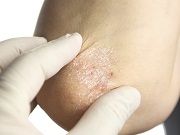Study Finds Long-term Safety and Efficacy in Psoriatic Arthritis Treatment
Biologic agent golimumab effective over 5-year span in treating disease symptoms and improving quality of life.

A recent study finds the biologic anti-tumor necrosis factor-α (TNF) agent golimumab to maintain its efficacy and safety over a 5-year span for the treatment of the arthritic and dermatologic symptoms of psoriatic arthritis (PsA).
This Article was oroginally published on the Specialty Pharmacy Times website
The study, published online on April 19, 2014, in Annals of the Rheumatic Diseases, evaluated golimumab in 405 randomized PsA patients. The patients had active PsA, defined as 3 or more swollen and tender joints and active psoriasis.
The patients were also naive to anti-TNF therapy, with plaque psoriasis that included a qualifying lesion diameter equal to or greater than 2 cm regardless of therapy with disease-modifying antirheumatic or nonsteroidal anti-inflammatory drugs.
The researchers randomly assigned patients into 3 groups that received subcutaneous placebo, 50 mg of golimumab, or 100 mg of golimumab every 4 weeks through 20 weeks. Following 24 weeks, all of the patients received 50 mg or 100 mg of golimumab. Over the 5-year span, 126 patients discontinued treatment.
The study found at least a 75% improvement in the Psoriasis Area and Severity Index (PASI75) at the 5-year mark in 60.8% to 72.2% of patients with baseline psoriasis involving 3% or more of the body surface area. The treatment was also found to improve nail psoriasis severity.
The researchers noted clinically meaningful improvements in physical function and health-related quality of life scores. Increasing the dose of golimumab yielded an approximately 44% improvement in the PASI scores.
The study found treatment with golimumab led to meaningful improvements in physical function, enthesitis, dactylitis, and skin manifestations, with more than 60% of patients achieving PASI75 improvement after 5 years.
There were minimal changes observed in radiographic scores from baseline to year 5, which suggests a long-term effect of golimumab in inhibiting radiographic progression, the researchers noted. There were no meaningful differences found in the efficacy or safety outcomes between 50 mg and 100 mg doses of golimumab, other than a limited number of patients who developed opportunistic infections in the 100-mg group.
Serious adverse events included 10 patients with basal cell carcinoma; 5 patients with myocardial infarction; 3 patients with cholelithiasis; and 2 patients each with breast cancer, abscess, cellulitis, pneumonia, arthritis, intervertebral disc degeneration, upper abdominal pain, vomiting, tibia fracture, accidental death, chest pain, and superficial thrombophlebitis. Serious infections developed in 15 patients over the course of the study across treatment groups.
The combination of the sustained clinical and radiographic efficacy and safety of the treatment was found to be consistent with other anti-TNF agents used to treat PsA.
“Golimumab dose escalation occurred in approximately one-quarter of randomized patients and, given low discontinuation rates due to lack of golimumab efficacy, likely reflects a treat-to-target therapeutic approach in patients with residual disease activity,” the study authors wrote. - See more at: http://www.specialtypharmacytimes.com/news/Study-Finds-Long-Term-Safety-and-Efficacy-in-Psoriatic-Arthritis-Treatment#sthash.x9x5uYzw.dpuf
Click here to access the full-text version of this article on the Specialty Pharmacy Times website.